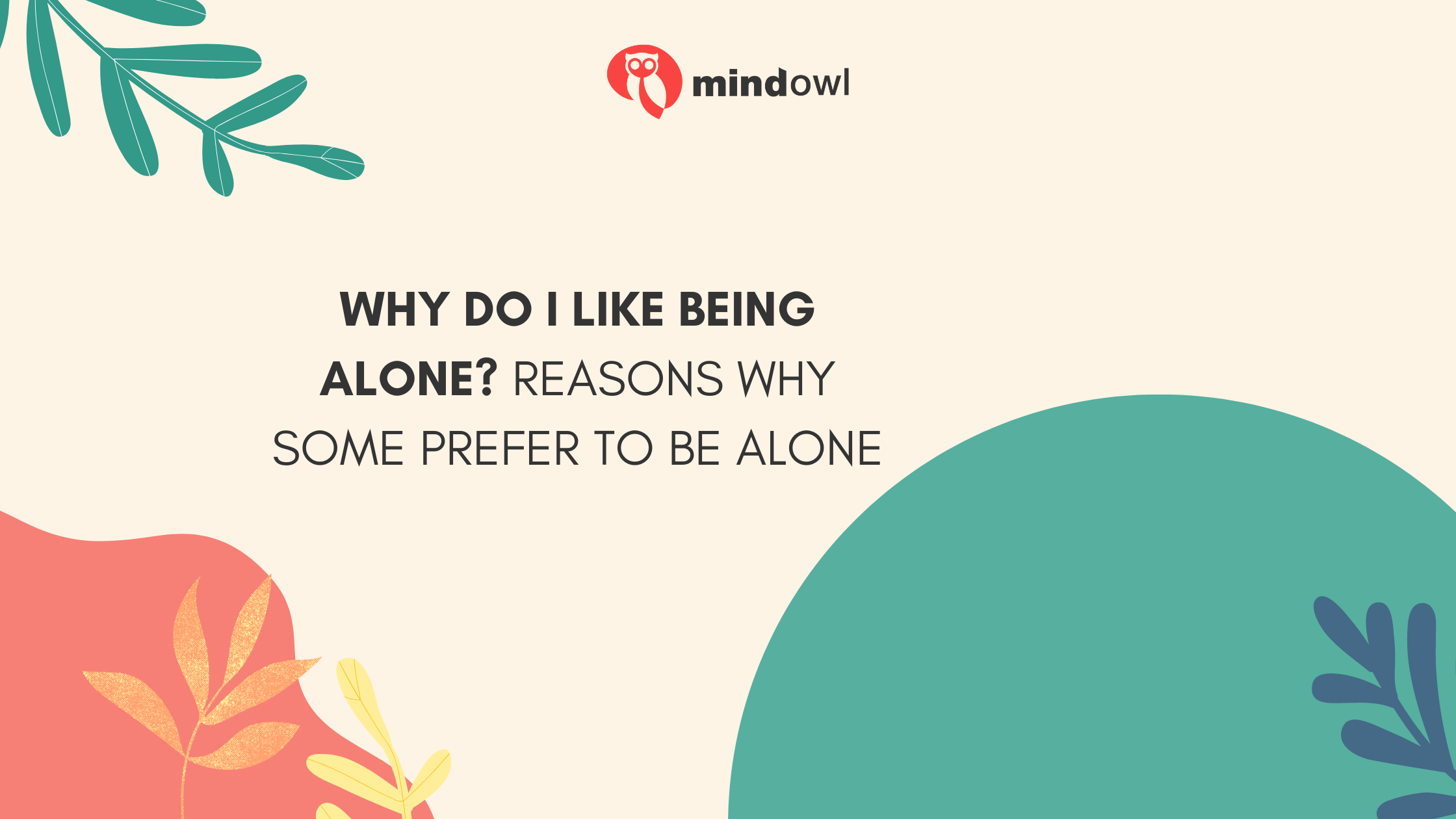Do you ever find yourself breathing a sigh of relief when plans get cancelled? Or feel that buzz of happiness when you imagine a day with just your own company? You’re not alone. Many people realise they genuinely enjoy spending time by themselves, away from the noise and demands of social situations.
This doesn’t mean they’re lonely; it’s quite the opposite. It signifies a comfort and contentment in their solitude.
Loving to be alone isn’t about shunning society or being antisocial. Rather, it’s about cherishing moments of solitude where you can reflect, grow, and recharge mentally. Our article will dispel the myth that finding joy in aloneness hints at deeper issues.
Instead, we’ll show how this preference for solitude is often linked to traits like introversion and emotional independence — suggesting it could actually be a sign of personal strength and self-awareness.
See why enjoying your own company might just be a superpower!
Key Takeaways
- Some people find happiness in being alone because they are introverts or highly sensitive, which means crowded places can feel overwhelming.
- Enjoying solitude is a sign of emotional independence and self-sufficiency, showing that a person doesn’t need others to validate their feelings or choices.
- Spending time alone helps with mental recharge and reduces stress levels. It’s necessary for both creativity and personal growth.
- Being happy alone often leads to deeper connections rather than having lots of acquaintances, as it allows for more meaningful interactions.
- While solitude is beneficial, noticing when it turns into harmful loneliness is essential. Seeking help during such times can prevent mental health issues.
Exploring Personal Traits
Are you someone who finds comfort in solitude and enjoys spending time alone? Maybe you are an introvert who values deep connections over numerous acquaintances. High sensitivity to social stimuli might make crowded social situations overwhelming for you.
Introversion as a Preference
Introverts find joy in solitude and often need their alone time to recharge. They are wired differently from extroverts, responding less eagerly to rewards that social settings might offer.
This difference comes down to how introverts process dopamine, a feel-good neurotransmitter associated with reward and motivation. Unlike extroverts who seek out more dopamine for happiness through social interactions, introverts require less of it to feel content.
This fundamental distinction helps explain why crowded parties or busy environments might overwhelm someone who enjoys being alone.
Dr. Marti Olsen Laney, in her work, highlights that introverts not only manage dopamine differently but also find pleasure in activities fuelled by acetylcholine. This neurotransmitter supports focus and calmness during solitary pursuits like reading or hobbies that allow deep thinking.
Activities involving inward focus can be as rewarding for an introvert as a lively discussion is for an extrovert because of this unique biochemical landscape favouring acetylcholine over dopamine during quiet moments.

High Sensitivity to Social Stimuli
People who prefer to spend time alone often feel overwhelmed by too much social stimulation. This can happen because their brains and nervous systems handle things differently. Imagine walking into a crowded room and feeling every conversation, the music, even the lighting, is just too much.
For highly sensitive people (HSPs), this isn’t just uncomfortable; it feels like their senses are on high alert all the time. They pick up on subtleties others might miss, like slight changes in tone or non-verbal cues that hint at how someone really feels.
This keen awareness makes them crave solitude as a way to process everything they’ve absorbed. It’s not about disliking people or being unsociable; rather, it’s about needing quiet to unload all those emotions they’ve picked up from others.
Think of it as emotional decluttering. HSPs often find themselves carrying the weight of other people’s feelings without meaning to. Being alone gives them space not only to breathe but also to separate their own emotions from those they’ve inadvertently collected during social interactions.
Emotional Independence
Feeling comfortable alone is a sign of emotional independence. It means not needing approval from others to feel good about oneself.
Comfort in Solitude
Finding comfort in solitude is a sign of emotional independence. Many people who love being alone see this time as vital for personal growth and happiness when alone. They don’t rely on others to fill their silence or validate their worth.
Instead, they find peace and joy in their own company. Solitude allows them to understand themselves deeply, fostering a strong sense of self without the need for external approval.
Choosing to spend time alone can be empowering. It’s a conscious decision to enjoy one’s own company and personal hobbies, thought processes, and leisure activities without feeling lonely or cut off from the world.
This preference is not about avoiding social interactions but rather about finding balance and rejuvenating one’s mind away from social stimuli that might feel overstimulating.
Solitude is not loneliness; it’s a chosen moment of self-reflection and rejuvenation.
Self-Sufficiency Without External Validation
Being happy alone comes from knowing you don’t need anyone else to validate your choices or feelings. Autonomy narratives, which tell stories of individuals finding freedom and happiness in solitude, show a strong link with well-being at all stages of life.
People who value self-sufficiency understand that their worth isn’t tied to others’ opinions. They find inner peace by focusing on personal goals and values rather than seeking approval.
Choosing to spend time alone allows for reflection and growth without the pressure of meeting societal expectations. This path fosters confidence and resilience as one learns to rely on their own judgement.
Avoiding the strain of constantly trying to please everyone leads to a more fulfilling life where decisions are made based on what truly brings joy and satisfaction personally, not just what looks good in the eyes of others.

Social Preferences
Preferring deep connections over numerous acquaintances is a common trait. Avoiding drama and superficial interactions can be beneficial for emotional well-being.
Avoidance of Drama and Superficial Interactions
Some people prefer being alone to avoid drama and shallow chats. Drama often drains energy, making solitude a peaceful choice for many. This preference isn’t odd but rather a sign of seeking meaningful interactions over quantity.
Such individuals find happiness in deeper connections where conversations go beyond surface-level topics.
Choosing to stay clear of superficial interactions allows one to invest time wisely in relationships that fuel personal growth and emotional well-being. In this respect, those who enjoy spending time alone are not avoiding socialising entirely; they’re selective, prioritising quality over quantity in their social engagements.
Solitude is the soil in which genius is planted, creativity grows, and legends bloom; faith in oneself is the rain that cultivates a hero to endure the storm, and bare the genesis of a new world, culture.
Valuing Deep Connections Over Numerous Acquaintances
People who enjoy being alone often find more value in deep connections than having many acquaintances. They seek meaningful interactions that go beyond surface-level chit-chat. This preference isn’t just about avoiding crowds or social events; it’s about nurturing relationships that are truly rewarding and fulfilling.
For these individuals, a few close friends provide more happiness and support than a large group of contacts ever could.
This choice reflects a desire for quality over quantity in social connections. It’s not about being avoidant but rather selective with whom they invest their time and energy. Creating bonds that are rich in understanding and support contributes markedly to one’s well-being across the lifespan, as shown by the study involving 2,035 participants—including adolescents, adults, and older adults—which highlighted autonomy narratives correlating strongly with well-being in solitude.
Choosing to spend time alone or with fewer people allows for deeper exploration of these valuable connections, leading to greater personal satisfaction and emotional independence.
Mental Health Considerations
When spending time alone, it’s essential to assess mental well-being. Recognising the need for solitude as a form of self-care can be crucial in maintaining good mental health. Understanding when solitude becomes isolating is vital for seeking additional support or strategies to maintain emotional well-being.
Using Solitude for Mental Recharge
Solitude acts as a haven for many, offering a quiet moment to recharge from the day’s hustle. People find clarity and peace in those solo moments, away from life’s constant chatter.
Studies have shown that spending time alone can greatly reduce stress levels. This calming effect is critical for mental well-being. Individuals use this time to connect with their true selves, gaining insights and purposes that crowd noise often drowns out.
Enjoying time alone isn’t just about avoiding others; it’s about valuing quality over quantity in human connections and giving the mind space to rest and rejuvenate. For some, solitude is when creativity flourishes—away from distractions, they turn ideas into reality.
The absence of external pressures during these solitary periods enhances self-development and spiritual growth, making solitude not just important but necessary for personal progress.
When Solitude May Signal Deeper Issues
Feeling lonely for prolonged periods can be a warning sign of potential mental health issues. Studies show that loneliness is linked to a decline in both physical and mental health, increasing the risk of developing conditions such as dementia, Alzheimer’s, heart disease, and stroke. For those who prefer the comfort of home, a near virtual IOP program can offer professional mental health support while maintaining your personal space.
Additionally, individuals experiencing loneliness are more likely to suffer from depression. It is crucial to recognise these signs early on and seek support if feelings of solitude persist.
Moreover, key life events often trigger periods of loneliness or a decline in mental health. Recognising the harmful effects of prolonged solitude is essential in addressing potential underlying issues that may contribute to these feelings.
Professional guidance and support systems can play a vital role in managing and overcoming challenges related to persistent loneliness.
Conclusion
The preference for solitude is a valid and common aspect of human behavior. Whether driven by introversion, a desire for independence, or the need for peace and productivity, enjoying time alone can significantly contribute to one’s well-being. Understanding the reasons behind this preference can help individuals make the most of their alone time and ensure a balanced and fulfilling life.
FAQs
1. Why might I like being alone?
There are several possible reasons why you may prefer to be alone. It could stem from introversion, where being around others can feel overstimulating and draining… or you might simply find tranquility and happiness when you’re alone.
2. Is it normal to want to be alone?
Some people choose to spend time alone as they feel fulfilled and energised in their own company… while others may find socialising tiresome or stressful due to conditions such as social anxiety.
3. Can preferring solitude indicate a neurological disorder?
While some individuals who have certain neurological disorders may choose to be alone, it’s important not to jump into conclusions… Preferring solitude doesn’t automatically equate having a disorder—it could just be part of your personality!
4. How does society view those who like being single or living alone?
Unfortunately, there can sometimes be a social stigma attached to choosing the single life or living home alone… But remember, everyone has different needs and preferences—what matters most is that you live life on your own terms.
5. Can hobbies play a role in preferring solitude?
If your hobbies involve activities like reading, playing games or watching movies which are often enjoyed solo—you might enjoy taking time for yourself more than being around other people…
6. What if I always want to be alone? Should I seek help?
If you constantly crave solitude and struggle with interacting with others—it could signal an underlying issue such as attachment theory issues or extreme social anxiety… In this case, speaking with a therapist could provide helpful strategies that increase your comfort level during social interactions.
MindOwl Founder – My own struggles in life have led me to this path of understanding the human condition. I graduated with a bachelor’s degree in philosophy before completing a master’s degree in psychology at Regent’s University London. I then completed a postgraduate diploma in philosophical counselling before being trained in ACT (Acceptance and commitment therapy).
I’ve spent the last eight years studying the encounter of meditative practices with modern psychology.

